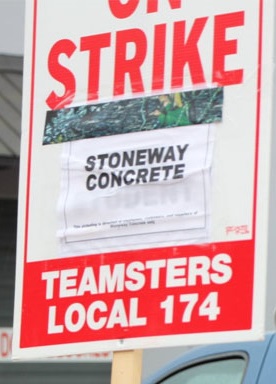HDC Seeking Fair Resolution to Concrete Strike

Unionized concrete truck drivers stopped driving throughout King County and the impact of the concrete truck drivers’ strike has a significant detrimental effect on the production of affordable housing. The negative impacts are substantial and as housing advocates, we are seeking a fair resolution as fast as possible.
As the Housing Development Consortium (HDC), we support the workers being paid fair wages and recognize the connection between wages and housing stability. We urge bargaining partners to advance good faith negotiations that include a fair contract for workers in tandem with ensuring the creation of desperately needed affordable housing.
The concrete strike has measurable financial impacts on affordable housing projects. The related delays cost the projects in two ways. First, the general contractor is entitled to schedule extensions that come with a cost. Second, the delay will force additional interest to accumulate on the construction loan and will incur delay penalties due to the late delivery of the Low-Income Housing Tax Credits. The combination of these two is enumerated at a negative cost impact of $3.8M collectively and grows each day the work stoppage continues.
This shortfall will need to be filled by public funders, which will divert funds that otherwise could subsidize additional new affordable housing units. Our analysis estimates that the impact will prevent the construction of at least 38 new units, thus further contributing to our housing crisis in the Puget Sound region.
The second impact is the fact that approximately 4,000 people who need housing security and safety now will have to wait longer for housing. Over 1400 units of housing will be delayed by the strike and the recovery time thus causing an extension of housing insecurity for seniors and families along with the associated health risks.
The region’s housing is already in a sustained crisis. We are two years behind in housing production. Not keeping up with population and job growth has exacerbated the upward pressure on housing costs. We need to address the housing backlog soon to soften the impact on home prices and rents. This has also contributed to the displacement of Black Indigenous and People of Color (BIPOC) households through gentrification. People who would like to live close to their jobs in our communities are being pushed further out and spend hours commuting.
It’s time for both sides to meet at the bargaining table to put the issue of affordable housing at the center of its negotiations to better the lives of our communities. In much of our region, the wage gains workers may win in their contracts lag far behind the increasing costs they confront when they rent or try to purchase a home. By coming to an agreement on contract terms and immediately supporting affordable housing projects to move forward urgently, employers and unions can play a crucial role in creating more desperately needed housing.
Brian Lloyd is the Board President of the Housing Development Consortium of Seattle-King County. HDC strives each day to create a more robust and connected sector to better respond to our region’s incredible affordable housing need.


